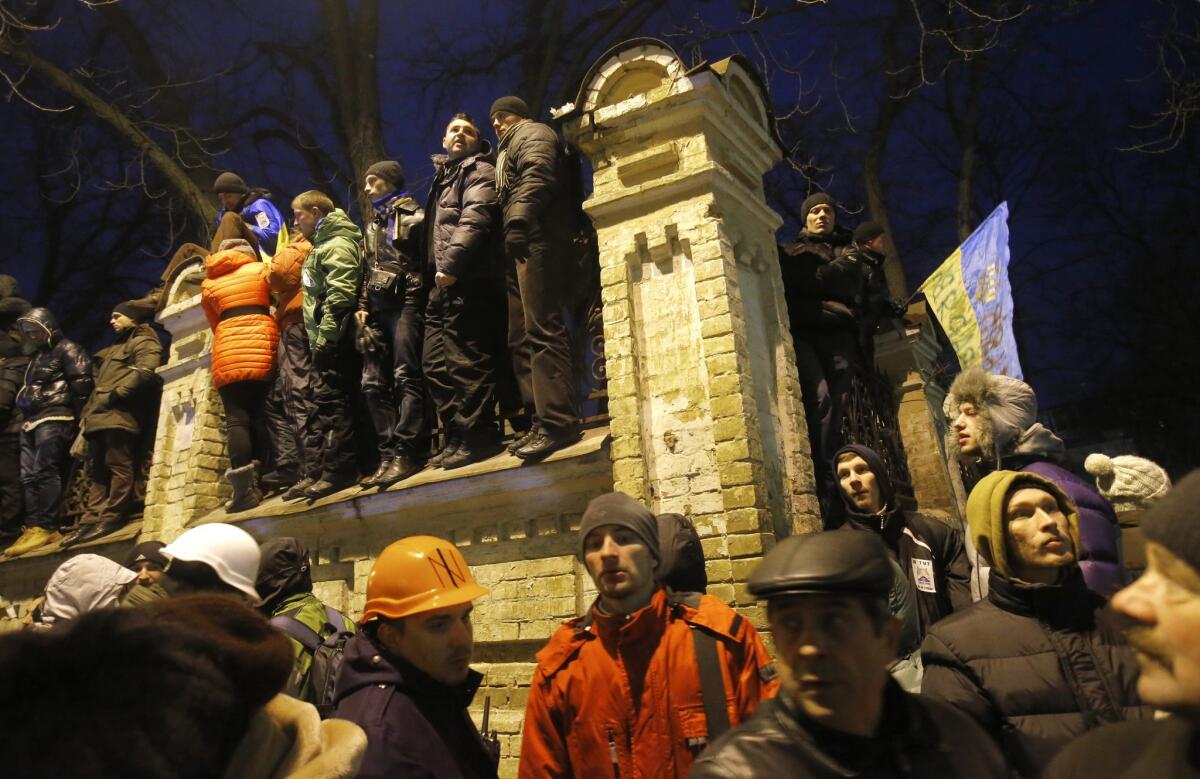Ukraine protests can’t alter the cost of rejecting Russia

- Share via
Antigovernment protests in Ukraine’s capital have inspired democratic idealists to hope for a replay of the 2004-2005 Orange Revolution, which swept away the authoritarian government that ruled after the breakup of the Soviet Union.
But no amount of dreaming that Ukraine can escape Russia’s controlling embrace to partner instead with the European Union can change the economic reality of Kiev’s dependence on good relations with Moscow.
Russian President Vladimir Putin is crafting his legacy around the Eurasian Union, his vision of a Moscow-orchestrated trade bloc to unite the former Soviet republics and rival the Western alliance based in Brussels.
And Ukraine, with 45 million people and the biggest economy in the ex-Soviet region aside from Russia’s, is a crucial component of the eastern area over which the Kremlin leader intends to spread his influence.
Protesters have turned out daily by the tens or hundreds of thousands to oppose Ukrainian President Viktor Yanukovich’s Nov. 21 decision to shelve an agreement for closer alignment with the 28-member European Union.
Government officials argued that Ukraine couldn’t afford to irritate Russia, on which its depends heavily for natural gas and equipment to run Soviet-era factories as well as for financial help in dealing with a burgeoning debt crisis.
But the government led by Prime Minister Mykola Azarov undermined its pledges of eventual closer affiliation with the West, which would require concessions toward political openness, when police on Sunday dispersed the demonstrators with truncheons and tear gas. Nearly 300 people were injured in the ensuing melee, including more than 100 police.
In the face of angry and emboldened protests on Monday, Yanukovich appeared to waver slightly, promising to pursue the European agreement once Ukraine’s economic ties with Moscow were secured. His call to EU leaders to say he was sending a delegation to Brussels to keep the trade and association deal alive was taken by the opposition as a sign of weakness.
The opposition overplayed its hand, though, with its call for a national strike and a parliamentary vote of no-confidence in the government. Protesters blocked government workers from ministries and the Supreme Rada, or parliament, giving Azarov grounds to claim the opposition disruptions showed “all the signs of a coup.”
On Tuesday, deputies of the Supreme Rada, which is dominated by Yanukovich’s Regions Party, soundly defeated the proposal by an alliance of opposition parties to vote out the government and stage early elections next year.
Yanukovich, apparently persuaded that the confrontation is on the wane, left for a three-day visit to China, where he was hoping to shore up trade and economic ties with a communist-era ally.
Thousands of protesters remained spread around Kiev’s main squares, vowing to keep up the street pressure for a new government and president. But political analysts have begun portraying the opposition challenge as a lost cause that will soon fizzle.
Caving in to the demands of an angry minority would “throw the country into economic and political turmoil,” warned lawmaker Oleg Tsaryov in an interview with The Times’ Sergei L. Loiko in Kiev on Tuesday. “And also, we are not impressed with the numbers of people out there in the square, which are significantly lower than what they had out there in 2005 during the so-called Orange Revolution when we gave in to their pressure,” Tsaryov said.
The opposition is now in a quandary, unsure how to play its one remaining card, said Vadim Karasyov, director of the Institute of Global Strategies think tank.
What the opposition has left, Karasyov said, is people in the street, “who will not be out there in the cold day and night seeing that nothing is being achieved.”
ALSO:Corruption worsens in world’s conflict areas, 2013 survey finds
Egyptian poet Ahmed Fouad Negm, voice of a nation, dies at 84
North Korea’s No. 2 official may have been ousted, spy agency says
A foreign correspondent for 25 years, Carol J. Williams traveled to and reported from more than 80 countries in Europe, Asia, the Middle East and Latin America.
More to Read
Sign up for Essential California
The most important California stories and recommendations in your inbox every morning.
You may occasionally receive promotional content from the Los Angeles Times.











